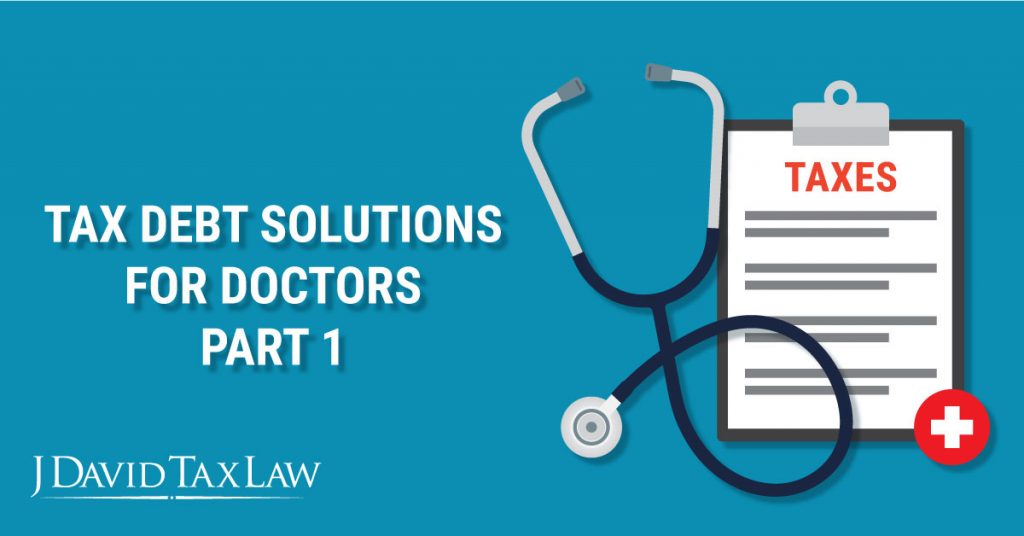Like all other professions and businesses, Federal tax law requires doctors to report income, track day-to-day expenses, and remit taxes when they are due. Doctors who also have medical practices are required to file and pay quarterly 940 and 941 payroll taxes. When doctors don’t pay their taxes, similar to all other businesses and professions, doctors can come face to face with an aggressive pursuit by the IRS or state tax agencies. When the delinquent tax debt is from failure to pay payroll tax, the actions can lead to the loss of his or her medical license due to criminal charges that can be filed for the doctor’s failure to pay 940 and 941 taxes. This is a very serious offense because payroll tax is held in trust from an employee’s paycheck and should be paid to the Internal Revenue Service when it is due. If an individual or business owes a Payroll Tax Debt, they should never complete the Trust Fund Recovery Interview with a Revenue Officer. The IRS may threaten you, but they cannot compel you to complete it without legal representation. This form interview is IRS Form 4180. The answers to the questions can lead to perjury and/or tax evasion Federal criminal charges. Without counsel present or legal counsel to guide you on what to answer or not answer, do not complete this potentially incriminating form interview.
Whether it be personal or business tax-related, if you are a doctor with tax debt issues, our team of tax lawyers is experienced at working with doctors in every state. For your unique situation, we can develop creative tax debt strategies and we can defend you against Federal and State tax agencies. In the last four years alone, we have fought for 156 doctors with a 91% success rate in gaining successful outcomes.
To help demonstrate our experience, we put together the following article with case studies and the strategies we leverage to secure successful outcomes for every client.
Dr E. – Tax Debt Case Study # 1
For assistance settling her federal payroll tax debt totaling
$509,000, Dr. E contacted J. David Tax Law. The IRS assigned a Revenue Officer (RO) and made appearances at Dr. E’s practice and demanded payment. In the presence of staff, the Revenue Officer had made threats to shut the practice down. Dr. E and her staff had become concerned it would happen. To pay the tax debt, Dr. E had begun attempting to sell assets such as real estate to raise cash. She needed immediate help in negotiating the best possible solution so the tax debt would not shut down her practice. The IRS had imposed a lien on some of her properties and they would not release the lien so the debt could be paid. The IRS agents were close to referring Dr. E to the United States Department of Justice for asset seizure of all her property so it could be auctioned after seizure for her unpaid Federal Payroll Taxes. This right is granted to the IRS and Justice Department under Part 9, Chapter 7, Section 9 of the Internal Revenue Service Manual.
J. David Tax Law’s Customized Solution for Dr. E:
To save her medical practice allowing her employees to remain employed and successfully settle Dr. E’s tax debt, our tax experts handled all IRS Revenue Officer negotiations. The legal staff performed an investigation into the tax debt to ensure it was indeed valid, an assessment for maximum penalty abatement, and most importantly a Federal lien subordination agreement that would allow Dr. E to pay the tax debt down by liquidating the real estate. The outcome we achieved included a reasonable installment agreement of $3,760 less per month than the original demand from the IRS after Dr. E paid the debt down to $211,700. This plan we structured allowed Dr. E’s practice to remain sustainable while she could pay the remaining tax debt over the next several years. Dr. E was very pleased with the outcome as it put her in compliance with the IRS. It also ensured that her medical practice could do business while continuing to grow.
Dr. T – Tax Debt Case Study # 2
For assistance settling his federal personal income tax debt totaling
$207,000, Dr. T contacted J. David Tax Law. The IRS assigned a Revenue Officer, and a demand for immediate payment in full with a 30-day deadline was sent to Dr. T. After the death of his accountant of 23 years, Dr. T did not file his federal tax returns for the last three years. For three weeks following his receipt of the demand letter, he waited and did not take action, so by the time he contacted us, he needed tax law help within a few days’ time to protect his family’s home and to attempt removal of the IRS bank levy. The IRS levy took $18,901 from Dr. T’s personal bank account the day before he contacted J David Tax Law. The IRS used the amount taken from Dr. T’s bank account to settle a portion of the outstanding tax debt. To settle the remaining portion, the IRS planned to institute a wage levy to seize 65% of Dr. T’s medical practice wages if the full payment deadline was not met.
J. David Tax Law’s Customized Solution for Dr. T:
To settle Dr. T’s tax debt, prevent the imminent wage levy, and alleviate Dr. T’s concerns, the first thing his tax attorney did was negotiate with the assigned Revenue Officer a collection hold. Following a financial analysis of Dr. T’s assets, verifying the tax liability assessed by the IRS as legitimate, and validating the extent of Dr. T’s tax debt, his attorney and staff prepared and filed three years of delinquent federal income tax returns. This brought Dr. T into IRS tax filing compliance. Once the federal returns were filed, the tax debt was lowered tremendously since the IRS had created substitute returns for Dr. T with no expense allowances and they also assessed a 25% Failure to File Penalty for unfiled taxes. Dr. T’s attorney was then able to negotiate a $639 per month installment agreement with the IRS and successfully got $11,901 returned from his original bank levy.
Click here to read Tax Debt Solutions For Doctors Part 2.
We Offer Customized Solutions for Doctors with Tax Debt
When you have State or Federal tax debt, it will cause tax agencies to assess large penalties and even impose criminal charges. Their collection attempts include an aggressive pursuit if you do not act quickly to resolve your tax debt issues. If you are a doctor and have been contacted by a State agency or the IRS regarding your delinquent tax debt, our tax attorneys are here to help in all 50 states.
Click here to request a no-cost, no-obligation consultation with our firm.




















